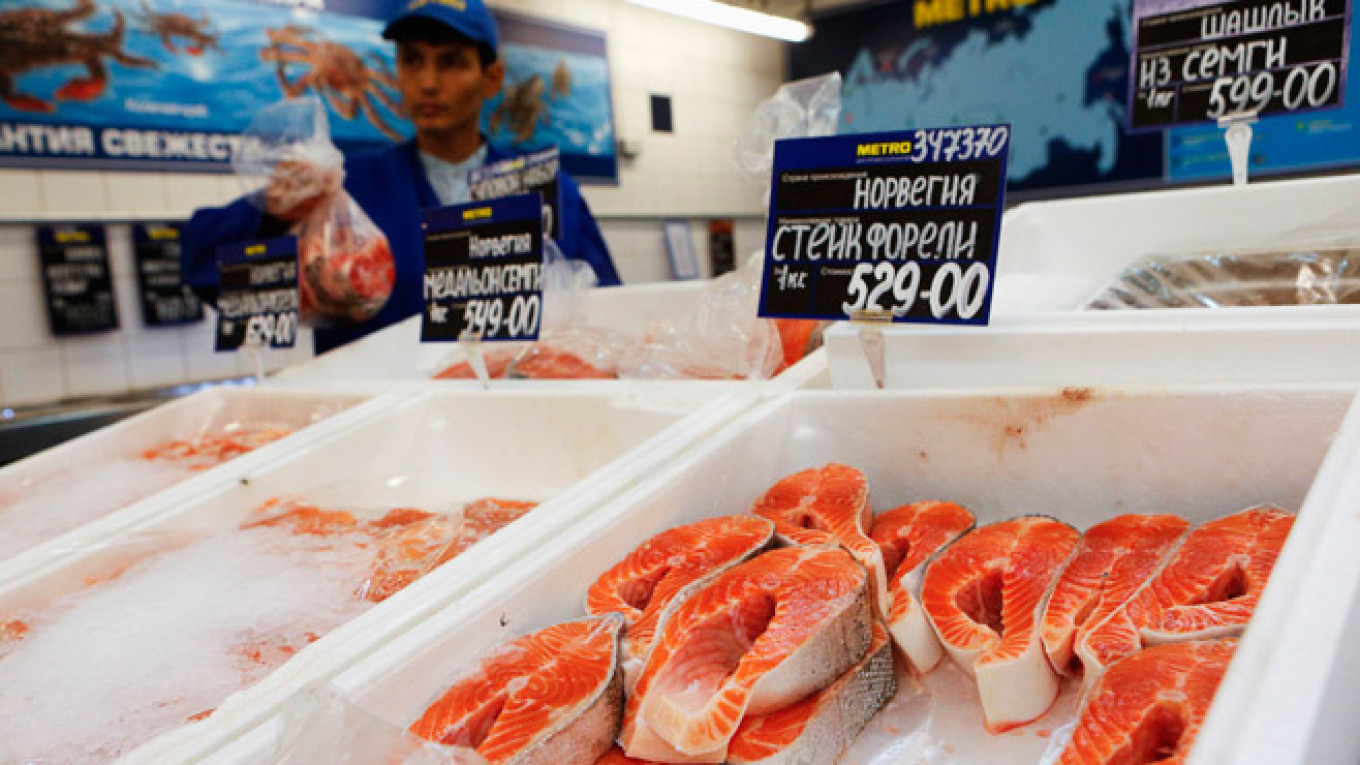OSLO — Norway's leading salmon farmers could escape the worst of Moscow's sanctions on Western countries by redirecting some of their produce from farms in Chile to Russia, a top producer and analysts said Monday.
Norway's fish-farming sector was thrown in turmoil last week when Russia, which consumes nearly 7 percent of the world's farmed salmon, banned all Norwegian seafood in retaliation for Western sanctions on Moscow over its role in the Ukraine crisis.
The ban dragged Norwegian salmon prices down by around 10 percent, forcing farmers in the world's biggest producer to find new markets for the fish, which were in some cases already packaged and sent off to Russia when the ban came into effect.
"We expect that Chile will be able to cover some of the demand coming from Russia, and any gaps in the market would then be covered with fish from Norway," said Astrid Vik Aam, a spokeswoman for fish farmer Cermaq, which produces half of its fish in Chile.
"There will be a bit of rearranging in the market."
She added that Cermaq would then supply regions that normally get salmon from Chile, like the United States and Asia, with produce from Norway.
Cermaq and Marine Harvest — the world's biggest fish farmer — are also among the biggest producers in Chile and analysts said the cost of redirecting fish is not overwhelming as Chile already supplies some European markets.
"A lot of Chilean salmon is already destined for the EU and competes directly with Norwegian produce so it's not terribly demanding to send a ship, let's say to Saint Petersburg instead of Amsterdam," said Georg Liasjoe, an analyst at ABG Sundal Collier.
Cermaq shares rose 9.5 percent on Monday while Marine Harvest gained 4.3 percent, both rebounding from big falls the previous week. Still, both are trading below levels seen before Russia's sanctions were introduced.
Faroe Wines?
Another effect of the sanctions could be that Russia will buy more frozen salmon, due to longer shipping times and the market uncertainty, resulting in a broader shift in the market from fresh fish to frozen produce, said analysts and producers.
Also, the tiny Faroe Islands — an autonomous country within Denmark but outside the European Union in the North Atlantic — could come out a winner as Moscow's ban does not apply to its fishing sector.
Its biggest producer, Oslo-listed Bakkafrost, is already counting on increased business.
"If it is true that the Faroe Islands are not included in the ban, we will clearly increase salmon exports by a lot to Russia," Chief Executive Regin Jacobsen said.
"There will be others, perhaps Chile, that will fill the gap, so the total market balance will not that greatly affected," Jacobsen said.
Norway produces over half of the world's farmed salmon, well ahead of Chile. High salmon prices have left its producers with ample cash, using in part to expand operations abroad.
The Nordic country generates nearly $1 billion a month from seafood exports.
See also:
A Message from The Moscow Times:
Dear readers,
We are facing unprecedented challenges. Russia's Prosecutor General's Office has designated The Moscow Times as an "undesirable" organization, criminalizing our work and putting our staff at risk of prosecution. This follows our earlier unjust labeling as a "foreign agent."
These actions are direct attempts to silence independent journalism in Russia. The authorities claim our work "discredits the decisions of the Russian leadership." We see things differently: we strive to provide accurate, unbiased reporting on Russia.
We, the journalists of The Moscow Times, refuse to be silenced. But to continue our work, we need your help.
Your support, no matter how small, makes a world of difference. If you can, please support us monthly starting from just $2. It's quick to set up, and every contribution makes a significant impact.
By supporting The Moscow Times, you're defending open, independent journalism in the face of repression. Thank you for standing with us.
Remind me later.


